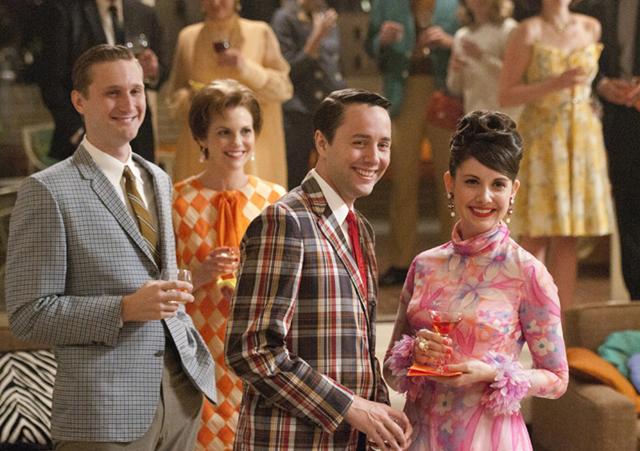It took me the better part of two seasons to realize the story of “Mad Men” was the story of the self-destructing Don Draper.
Then again, it took Draper himself at least three.
And as the bright and shining lie he’d crafted, arced and crashed at his feet — represented in real time by his shattered marriage and the shuttering of Sterling Cooper, the ad agency where Draper had just signed a sweet employment deal — we all started to see exactly what was at stake.
It was, and is, his soul.
The 1960s kindling around him — the death of a President, race riots and Viet Nam, all, in the textile of the show — Draper began to ask, especially moving into season four, Will I make it?
In the show’s fifth and final season, which premiered Sunday, we will have his answer.
‡
For more than half of the show, one couldn’t help but look at Draper (real name, Dick Whitman), and think, dude’s going down. Prideful and priapic, he bedded whomever he liked, or merely noticed, and enjoyed status as a top New York City ad man, at the birth of that industry.
But midway on his false life’s journey, Draper grew a conscience.
He began to ask questions — specifically by returning to his small post-divorce apartment to journal, instead of sleeping with the coed who, he remarked to himself, had no idea that she had no idea.
He began to let others ask questions — specifically by taking up with an educated, tough, attractive, business consultant, who encouraged his growth and refused to let him wallow in self-pity.
He began to tell the truth in advertising — for instance, by challenging the tobacco company money that helped build, and then destroy, his career to that point.
We began to think, dude might just make it.
He launched the new agency, asserted himself with his ex-wife Betty and began to build relationship with his children, culminating in an end-of-season-four trip to Southern California.
‡
Specifically, he went to Disneyland.
In the episode called “Tomorrowland” intersected all that had come before, good and ill: the settling of accounts with Don Draper’s life there with the cartoonish view of reality, the resolution and honesty … culminating in sex with, and a hasty marriage proposal to, his secretary Megan.
You wanted to believe him, even as the clichés rolled on.
He returned to New York City surprising all but shocking none by announcing he would wed.
‡
It’s not without reason that we think marriage can save.
But in the proposed union with a girl half his age (who looks eerily like Liv Tyler would, if she’d been born 30 years earlier) he abandoned his tough and lovely muse, Dr. Faye Miller, and crashed in esteem with his colleagues and underlings at Sterling, Cooper, Draper, Pryce.
The one who valued him as a person, and the many who lauded him as a performer, now can’t care less.
After rising from the depths of his lies, Draper is crashing again to earth.
The brief fling with honest living seems ended.
He hasn’t journaled in ages.
‡
So as season five begins, we’re still asking, Will he make it?
It’s not so much that he’s everyman. If he were, we could safely set him aside as symbol.
It’s that he could be any man, meaning the enemy could be us.
Black Americans are on the march, Southeast Asia will likely take Joan’s husband Greg and, surprisingly for television, this is not just a soap opera based at an ad agency instead of a hospital or law firm.
In this final season, Betty may stay bitter and new accounts will come and go. What we really care about, what we really want to know, is whether Don Draper will die. Or perhaps he already is and doesn’t know.
His sufferings and his salvations so far have all been of his own making.
Will it be enough?
‡
Based on the first episode, we’d have to say no. Everyone seemed so adrift — everyone, not just Don Draper. Each showed a pettiness, a predilection, a kink, a sin.
Yet each also showed a humanity. Not that this was always entirely good, but it was … potentially hopeful.
It’s the kind of excellence in story that stands out not only for being excellent but for being so rare. Mad Men does this a lot. It gets us wishin’ and hopin’ and thinkin’ and maybe even prayin’.
‡
That’s the battle, and it is ours.
That’s the story we’re to watch.
If he falls, How great will it be?
And will anyone notice?
